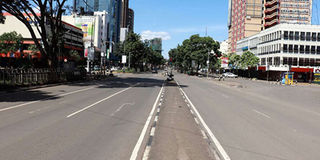Fear is unnecessary artillery in battle to end Covid-19

Kenyatta Avenue in Nairobi is deserted as Kenyans adhere to the nationwide curfew to help arrest the spread of coronavirus, on March 29, 2020. PHOTO | DENNIS ONSONGO | NATION MEDIA GROUP
What you need to know:
- During the Ebola epidemic, misinformation and myths from such sources were the greatest threat to the containment of the disease.
- The kind of fear we should have is the one that tells us to seek medical attention when we experience clinical signs of Covid-19.
A post-mortem analysis of disease outbreaks, epidemics and pandemics have noted the negative impacts fear had on preventive outcomes.
Fear — though a normal, understandable and a universal human reaction — in excessive doses, it is fatal.
Nonetheless, fear can be tapped for attitude and behaviour change when subdued as a servant and not a master.
As a master, it sends wrong signals and results in unhelpful mass hysteria and avoidance of otherwise helpful messages.
Franklin Roosevelt saw how fear was going to stoke the fire in America’s already bad situation.
At a time when economic depression had hit its rock bottom, he coined a phrase that resonates well with our current scenario — “The only thing we have to fear is fear itself".
That phrase did not only win him the presidency but resurrected the dying American spirit amid looming doom.
In 1997, the avian flu (H5N1) was first reported in humans with a seemingly very high mortality.
MISLEADING MESSAGES
Luckily, there was enough information about this virus, whose natural reservoir was wild birds. The influenza virus was fatal in domestic birds.
It easily crossed to humans through contact with fluids and tissue of infected or dead birds.
In early 2000s, there were localised outbreaks with the potential of a global spread. Millions of birds were destroyed in a bid to stem the spread of the disease.
Few countries in Africa reported the disease but almost all countries reported the fear even where the threat was minimal.
Huge economic losses were reported — not because of the disease but fear. Studies have since attributed part of the fear on wrong messages shared.
In 2014, during the longest, largest and deadliest Ebola outbreak, a team of anthropologists made a disturbing discovery in Liberia.
FAKE EXPERTS
Efforts were directed at West African countries that were the epicentre of Ebola.
It was wrongly assumed that risk perception index was high enough to push suspects to the nearest Ebola centres.
Many deaths had occurred at home and those taking care of them also tested positive. That revealed the negative effects of fear.
The slogan “Ebola Kills” was found to evoke excessive fear; it took over as a master and the disease claimed more than its epidemiologically assigned share.
Information and communication technology has advanced. There is demand for information and so is the supply.
The demand is a good audience trait but there are issues with the suppliers: all of a sudden, everybody has become an expert on Covid-19. Social media is awash with all sorts of messages.
Fear arising from correct information will always be within a threshold that arouses correct behaviour.
WRONG SOLUTIONS
The president and the Ministry of Health and its partners — Word Health Organisation and Unicef — have done an excellent job in giving the public correct information on virtually all aspects of Covid-19.
The mass media, too, has gone out of its way to run pro bono adverts on the coronavirus and invite to their studios experts to discuss the disease.
But, as expected, non-experts have joined the fray with messages that insinuate an Apocalypse or Armageddon.
During the Ebola epidemic, misinformation and myths from such sources were the greatest threat to the containment of the disease.
As a result, people took their patients to witchdoctors, others stayed with them at home and it was all lost.
Misinformation and myths arouse fear and prescribe the wrong solutions or none.
Now a pandemic is much larger than an outbreak or an epidemic, one reason we should choose wisely the kind of sources that give us information on Covid-19.
NECESSARY FEAR
The kind of fear we should have is the one that tells us to seek medical attention when we experience clinical signs of Covid-19.
These are: shortness of breath, coughing and sneezing. A fear to make us observe social distance. That which makes us wash our hands regularly and thoroughly with soap and running water.
Information that is not founded in science or from sources that are not experts in medical or related fields should be treated as noise.
Dr Othieno is a veterinary doctor and health communication expert. [email protected].



